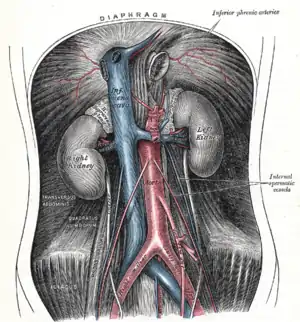Arteriosclerosis obliterans
Arteriosclerosis obliterans is an occlusive arterial disease most prominently affecting the abdominal aorta and the small- and medium-sized arteries of the lower extremities, which may lead to absent dorsalis pedis, posterior tibial, and/or popliteal artery pulses.[1]: 842
| Arteriosclerosis obliterans | |
|---|---|
 | |
| Abdominal aorta | |
| Specialty | Cardiology |
| Symptoms | The symptoms are caused by ischemia of the tissues. Intermittent claudication is manifested by pain, (cramping), numbness, and fatigue in the muscles on exercise. These symptoms are relieved by rest. There may be “rest pain” at night when in bed. Also increased sensitivity to cold, muscular weakness, stiffness of the joints, and paresthesia . Sexual impotence |
It is characterized by fibrosis of the tunica intima and calcification of the tunica media.
References
- James, William D.; Berger, Timothy G.; et al. (2006). Andrews' Diseases of the Skin: clinical Dermatology. Saunders Elsevier. ISBN 978-0-7216-2921-6.
This article is issued from Wikipedia. The text is licensed under Creative Commons - Attribution - Sharealike. Additional terms may apply for the media files.